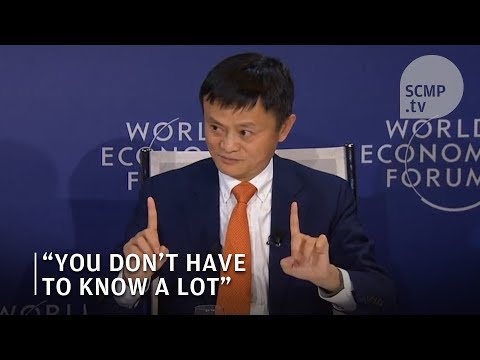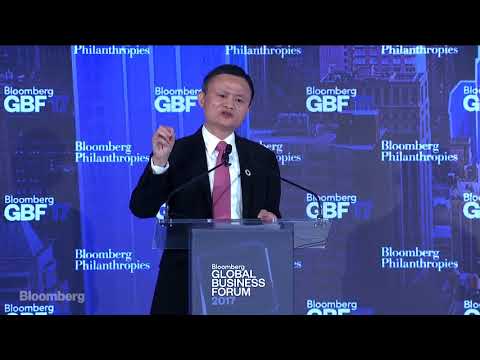How has Jack Ma diversified his business interests?
Jack Ma, the renowned Chinese entrepreneur and co-founder of Alibaba Group, has made significant strides in diversifying his business interests over the years. His visionary approach and entrepreneurial spirit have led him to explore various industries and sectors, expanding his influence and impact on the global business landscape. In this blog post, we will delve into the ways in which Jack Ma has diversified his business interests, showcasing his versatility and ability to adapt to changing market dynamics.
1. E-commerce Pioneer:
One of Jack Ma’s most notable achievements is the establishment of Alibaba Group, a multinational conglomerate specializing in e-commerce, retail, internet, and technology. Alibaba has transformed the way people shop and conduct business in China and beyond. Through its various platforms such as Taobao, Tmall, and Alibaba.com, the company has become a dominant force in the e-commerce industry, capturing a significant market share and revolutionizing the way transactions are conducted online.
2. Fintech Revolution:
Recognizing the potential of financial technology (fintech), Jack Ma ventured into the sector by establishing Ant Group. Initially started as Alipay, a digital payment platform, Ant Group has evolved into a comprehensive financial services provider. It offers a wide range of services, including online banking, wealth management, insurance, and credit scoring. Ant Group’s innovative solutions have disrupted traditional financial institutions, providing greater accessibility and convenience to millions of consumers.
3. Cloud Computing and Big Data:
Understanding the growing importance of cloud computing and big data analytics, Jack Ma expanded Alibaba’s services to include Alibaba Cloud. As one of the leading cloud computing providers globally, Alibaba Cloud offers a wide range of services, including storage, data analysis, artificial intelligence, and internet of things (IoT) solutions. By diversifying into this sector, Jack Ma has tapped into the increasing demand for scalable and secure cloud infrastructure, catering to businesses of all sizes.
4. Entertainment and Media:
In a bid to capture the booming entertainment and media industry, Jack Ma invested in various ventures. Alibaba Pictures, a subsidiary of Alibaba Group, focuses on film production, distribution, and ticketing services. The company has produced and distributed several blockbuster movies, showcasing Jack Ma’s commitment to promoting Chinese cinema globally. Additionally, he acquired the South China Morning Post, a leading English-language newspaper in Hong Kong, further expanding his influence in the media industry.
5. Artificial Intelligence and Robotics:
Embracing the potential of artificial intelligence (AI) and robotics, Jack Ma has invested in numerous AI startups and research initiatives. By leveraging AI and robotics, he aims to enhance productivity, improve customer experiences, and drive innovation across industries. One notable example is the creation of the Alibaba DAMO Academy, a research institute focused on AI, quantum computing, and other cutting-edge technologies. Through these initiatives, Jack Ma has positioned himself at the forefront of technological advancements.
6.
The Key Ingredients of Jack Ma’s Business Success: Exploring the Strategies Behind the Rise of Alibaba’s Founder
The Key Ingredients of Jack Ma’s Business Success: Exploring the Strategies Behind the Rise of Alibaba’s Founder
1. Diversification of Business Interests: Jack Ma has successfully diversified his business interests to ensure long-term growth and sustainability. One of the key ways he has achieved this is by expanding Alibaba’s operations into various sectors such as e-commerce, cloud computing, digital media, and entertainment. This diversification allows Alibaba to tap into different markets and customer segments, reducing its dependence on a single industry.
2. International Expansion: Jack Ma recognized the importance of expanding Alibaba’s presence beyond China early on. He focused on entering emerging markets with high growth potential, such as Southeast Asia, India, and Africa. By doing so, Alibaba was able to access a larger customer base and establish itself as a global player in the e-commerce industry. This international expansion also helped Alibaba overcome domestic competition and diversify its revenue streams.
3. Embracing Technology: Jack Ma’s success can be attributed to his ability to embrace and harness the power of technology. He understood the transformative impact of the internet and leveraged it to create innovative platforms and solutions. Alibaba’s use of advanced technologies like artificial intelligence, big data analytics, and cloud computing has enabled the company to optimize its operations, personalize customer experiences, and drive efficiency. This technological prowess has been a key driver of Alibaba’s growth and competitive advantage.
4. Strong Ecosystem Building: Jack Ma recognized the importance of building a strong ecosystem of partners and stakeholders. Alibaba’s ecosystem includes various entities such as Taobao (consumer-to-consumer platform), Tmall (business-to-consumer platform), Alipay (payment platform), and Cainiao (logistics platform). This interconnected network of platforms and services allows Alibaba to provide end-to-end solutions to customers and partners, creating a seamless and convenient experience. The strong ecosystem also encourages collaboration and mutual benefits among participants, further strengthening Alibaba’s position in the market.
5. Customer-centric Approach: Jack Ma understood the significance of putting customers at the center of his business. He focused on building customer trust and loyalty by providing high-quality products, reliable services, and exceptional user experiences. Alibaba’s customer-centric approach is evident through initiatives like buyer protection programs, customer reviews, and personalized recommendations. By prioritizing customer satisfaction, Alibaba has been able to attract and retain a large customer base, driving its growth and success.
In conclusion, Jack Ma’s business success can be attributed to his strategic approach of diversifying business interests, expanding internationally, embracing technology, building a strong ecosystem, and adopting a customer-centric approach. These key ingredients have enabled Alibaba to become a global powerhouse in the e-commerce industry, setting an example for aspiring entrepreneurs and business leaders.
The Alibaba Empire: Unveiling the Business Ventures Associated with Jack Ma
The Alibaba Empire: Unveiling the Business Ventures Associated with Jack Ma
1. E-commerce Giant: Jack Ma is best known for founding Alibaba Group, a multinational conglomerate specializing in e-commerce, retail, internet, and technology. Alibaba is the largest e-commerce company in China and one of the largest in the world. It operates various online marketplaces, including Taobao, Tmall, and AliExpress, catering to both businesses and consumers. With its innovative business model, Alibaba has revolutionized the way people shop and paved the way for the digital economy.
2. Cloud Computing: Recognizing the potential of cloud computing, Jack Ma expanded Alibaba’s business interests into this burgeoning field. Alibaba Cloud, also known as Aliyun, offers a comprehensive suite of cloud computing services, including elastic computing, database, storage, networking, and security. By leveraging its expertise in technology and infrastructure, Alibaba Cloud has become one of the leading cloud service providers globally, competing with giants like Amazon Web Services and Microsoft Azure.
3. Digital Payments: Another significant venture associated with Jack Ma is Ant Group, formerly known as Ant Financial. Ant Group operates Alipay, a mobile payment platform that has revolutionized the way financial transactions are conducted in China. Alipay allows users to make payments, transfer money, invest in wealth management products, and even hail a taxi. With its widespread adoption, Alipay has become an integral part of the Chinese economy and a key player in the global fintech industry.
4. Media and Entertainment: Jack Ma’s business interests extend beyond e-commerce and technology. Alibaba Pictures, a subsidiary of Alibaba Group, focuses on film production, distribution, and investment. The company has been involved in various high-profile projects, both domestically and internationally. In addition, Alibaba has invested in numerous entertainment companies, including Youku Tudou (a Chinese video hosting platform), and has ventured into sports broadcasting and ticketing.
5. Logistics and Supply Chain: Recognizing the importance of efficient logistics and supply chain management, Jack Ma established Cainiao Network. Cainiao is a logistics platform that aims to streamline the delivery process and enhance the overall customer experience. By leveraging big data and artificial intelligence, Cainiao optimizes route planning, warehouse management, and package tracking, ensuring timely and reliable deliveries. The platform collaborates with various logistics partners to provide end-to-end solutions for e-commerce businesses.
In conclusion, Jack Ma has diversified his business interests across various sectors, ranging from e-commerce and cloud computing to digital payments, media, and logistics. Through his visionary leadership and innovative approach, he has built an empire that has transformed industries and shaped the digital landscape in China and beyond. The Alibaba Group and its associated ventures continue to thrive, contributing to the growth of the global economy and redefining the way we live, work, and do business.
Decoding Alibaba’s Business Strategy: Unveiling the Secret Behind its Success
Decoding Alibaba’s Business Strategy: Unveiling the Secret Behind its Success
1. Jack Ma’s Visionary Approach:
– Jack Ma, the founder of Alibaba, has diversified his business interests by adopting a visionary approach. He saw the potential of e-commerce in China and believed in the power of the internet to connect businesses and consumers.
– By recognizing the untapped market opportunities in China, Jack Ma focused on building an online platform that could revolutionize the way people buy and sell goods. This vision led to the creation of Alibaba, which has since become a global powerhouse in the e-commerce industry.
2. Expansion into Various Business Segments:
– Alibaba’s success can be attributed to its diversification into various business segments. Jack Ma understood the importance of not relying solely on one source of revenue. As a result, Alibaba expanded its offerings beyond just e-commerce.
– One of the key areas of diversification for Alibaba is its cloud computing arm, Alibaba Cloud. This segment provides a range of cloud services to businesses, enabling them to store and process data more efficiently. With the growing demand for cloud services, Alibaba Cloud has become a significant contributor to Alibaba’s overall revenue.
– Additionally, Alibaba has ventured into the financial industry with the establishment of Ant Group, formerly known as Ant Financial. Ant Group offers a wide range of financial services, including mobile payments, wealth management, and consumer lending. This diversification into the financial sector has further strengthened Alibaba’s position in the market.
3. Embracing Technology and Innovation:
– Jack Ma understood the importance of technology and innovation in driving business growth. Alibaba has consistently invested in research and development to stay at the forefront of technological advancements.
– One example of Alibaba’s commitment to innovation is its focus on artificial intelligence (AI). The company has developed AI-powered solutions, such as personalized recommendations and chatbots, to enhance the customer experience on its platforms.
– Furthermore, Alibaba has embraced emerging technologies like blockchain, enabling secure and transparent transactions on its platforms. This adoption of technology has not only improved efficiency but also helped Alibaba gain a competitive edge in the market.
4. Global Expansion and Partnerships:
– Alibaba’s business strategy also revolves around global expansion and strategic partnerships. Jack Ma recognized the importance of expanding beyond China’s borders to tap into international markets.
– Alibaba has made significant investments in foreign companies and established partnerships with global brands. For instance, it has acquired a stake in companies like Lazada (Southeast Asia’s leading e-commerce platform) and invested in companies like Paytm (India’s largest digital payment platform). These partnerships have not only provided Alibaba with access to new markets but also allowed it to leverage the expertise of local players.
– Moreover, Alibaba has actively promoted cross-border trade through initiatives like the Alibaba Global Initiatives Program, which helps small and medium-sized enterprises (SMEs) expand their businesses globally.
Over the years, Jack Ma, the co-founder of Alibaba Group, has successfully diversified his business interests, expanding beyond e-commerce and into various industries. His ventures have allowed him to establish a global presence and solidify his position as one of the most influential entrepreneurs of our time.
**How has Jack Ma diversified his business interests?** One of the key ways Jack Ma has diversified his business interests is through investments in various sectors. He has invested in fintech companies such as Ant Group, which has become one of the largest digital payment platforms in the world. Additionally, he has ventured into the entertainment industry with investments in film production companies like Alibaba Pictures. Furthermore, Ma has expanded into cloud computing, logistics, and even real estate.
**What is the significance of Jack Ma’s diversification?** Jack Ma’s diversification strategy has allowed him to mitigate risks by not relying solely on one industry. By expanding into different sectors, he has been able to capitalize on emerging trends and tap into new markets. This has not only enhanced his personal wealth but also solidified Alibaba Group’s position as a leading global conglomerate.
**What challenges has Jack Ma faced in diversifying his business interests?** Like any entrepreneur, Jack Ma has faced challenges along the way. One of the main challenges has been competition. In each industry he enters, he faces established players and must find innovative ways to differentiate his businesses. Additionally, navigating different regulatory environments in various countries has also posed challenges for his international ventures.
**What is the future of Jack Ma’s diversified business interests?** The future looks promising for Jack Ma’s diversified business interests. With his strategic investments and global reach, he is well-positioned to continue expanding his influence and exploring new opportunities. As technology continues to advance and new industries emerge, Jack Ma’s ability to adapt and diversify will likely ensure his continued success.
In conclusion, Jack Ma has masterfully diversified his business interests, taking Alibaba Group from a small e-commerce company to a global conglomerate. His investments in various sectors have allowed him to capitalize on emerging trends, mitigate risks, and establish a strong presence in multiple industries. Jack Ma’s success serves as an inspiration to entrepreneurs around the world, showcasing the power of diversification and adaptability in the ever-changing business landscape.






I think Jack Mas success is all due to his secret love for pineapple pizza! 🍕🍍 #ControversialOpinions
I think Jack Mas success is just luck, not a genius business strategy. #ControversialOpinions
I dont understand why people are so obsessed with Jack Ma. There are other successful entrepreneurs out there too, you know!